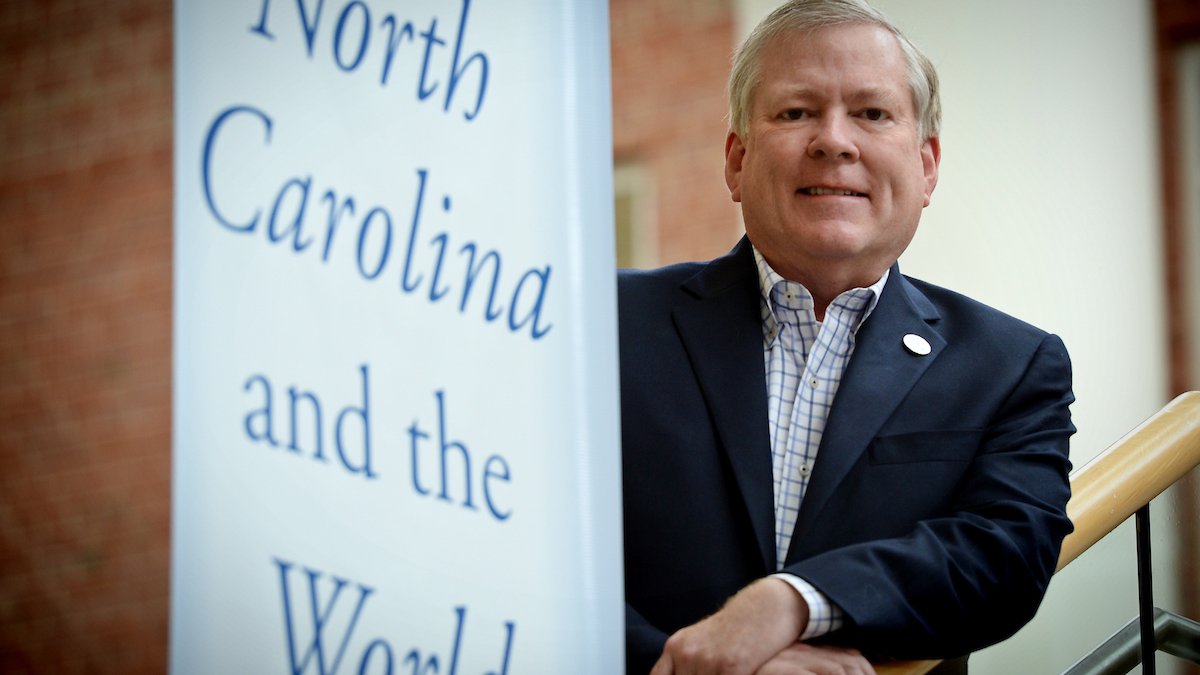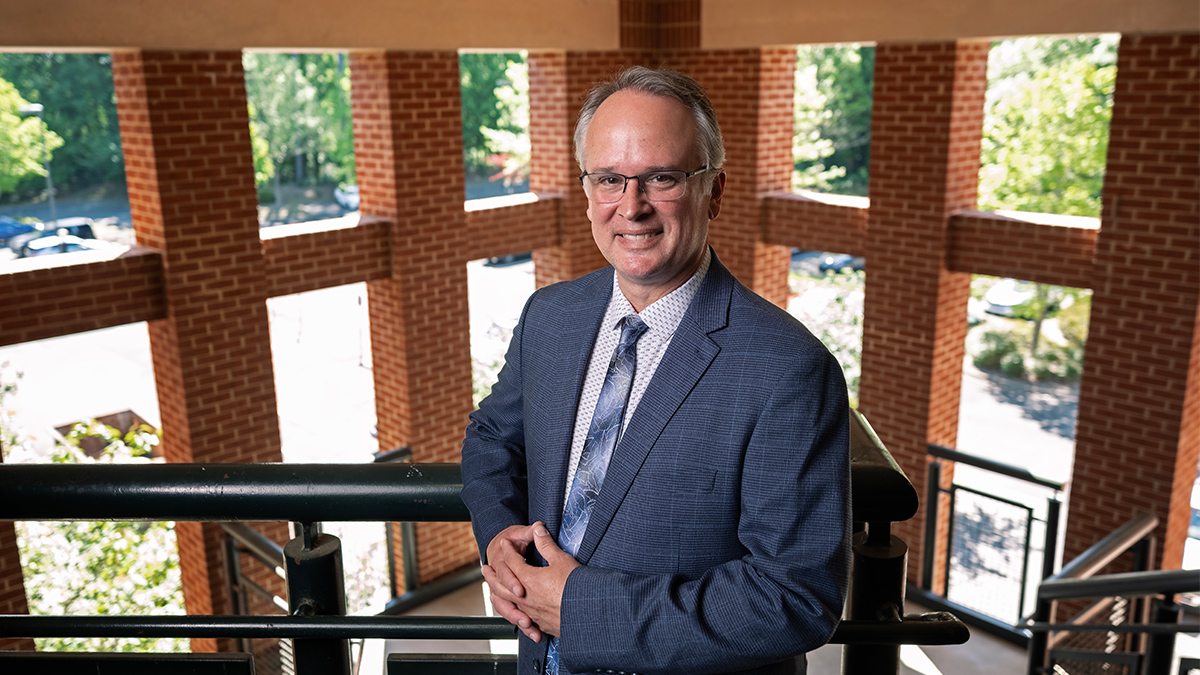Alex White sinks his teeth into dental public health
White’s joint appointment as an associate professor is believed to be the first endowed professorship in the nation linking dentistry and public health.

Alex White was a dentist in an inner city Boston hospital and did dental research for a nonprofit in the Pacific Northwest. He was a uniformed Public Health Service officer and policy adviser to the first Bush White House. He even helped Tom’s of Maine develop new products.
“My dad says I couldn’t keep a job,” he joked.
Since June 2014, White has been holding down a job that’s really two in one. He has been nominated as the first R. Gary Rozier and Chester W. Douglass Distinguished Professor in Dental Public Health. The endowed professorship would be a joint appointment to the School of Dentistry and the Gillings School of Global Public Health.
White’s joint appointment as an associate professor is believed to be the first endowed professorship in the nation linking dentistry and public health. White teaches in the Department of Dental Ecology in the fall and the Department of Health Policy and Management in the fall and spring semesters. His office is in McGavran-Greenberg Hall, part of the public health school.
The professorship honors Rozier, a professor of health policy and management at the public health school since 1976, who also directs the dental public health and residency-training program. The other honoree is Chester Douglass, professor emeritus of oral health policy and epidemiology at Harvard University who also held appointments at the UNC dentistry and public health schools in the 1970s. Douglass and his wife, Joy, are the donors who established the professorship.
“The UNC Schools of Dentistry and Public Health have long collaborated in providing education, research and community service in the interdisciplinary specialty of dental public health,” said Jane Weintraub, dentistry dean. “We have been very fortunate to recruit to our two schools Dr. Alex White, an outstanding health services researcher and one of the leaders in this field.”
The two-school professorship may be a first, but White has been combining dentistry and public health for much of his career. He started out as a dentist, getting his undergraduate and dental degrees at Carolina. “When I started out in dental school, to me – in my limited knowledge of the world as a first-year dentistry student – dentistry was about fixing teeth,” White said.
But the more he thought about the rural area in North Carolina where he grew up, the more he began to believe that dentistry was only part of the solution to a broad range of public health problems.
“Robeson County is one of the poorest counties in the state,” White said. And he saw how that poverty directly affected the public health of its residents. “If you don’t have a car, then you’re going to have a hard time getting to the doctor or the dentist. If you can’t afford good food, you’re not going to be as healthy. If you have a well instead of fluoridated water, you’re going to get more cavities.”
When he did a two-year residency at Brigham and Women’s Hospital in Boston, he saw some of the same difficulties among the poor residents of the inner city.
“The demographics were different,” White said, “but the access to care problems was the same.”
The ‘silent epidemic’
The dentist went on to get two master’s degrees (public health and health policy and management) as well as a doctorate in program evaluation from the Harvard School of Public Health. Like his degrees, White’s mission is two-fold: As a dentist, he wants to make sure oral health is included in discussions about public health. As a public health policy adviser, he wants all health professionals to approach issues in a more holistic way.
“Only one report from the Surgeon General’s office is about oral health. It came out in 2000,” White said. “It called dental disease ‘a silent epidemic’ that no one knows they have – because it doesn’t hurt or is not obvious.”
He grows most passionate when speaking of dental disease in children, especially poor children. “Forty percent of children in North Carolina start school with dental disease,” White said. “So we’ve already missed the boat if we wait for school-based programs. We have to figure out a way to access kids and get an early head start on the problem.”
One successful solution that he is evaluating now is called Into the Mouths of Babes, a statewide program that trains pediatricians and family doctors to provide basic preventive dental services for children insured by NC Medicaid. Treatment begins as soon as the baby gets a tooth and continues until the child is 3½ years old. Into the Mouths of Babes is a direct result of the work of Rozier, the professorship’s honoree, and has been adopted by more than 30 other states.
White became more involved in health policy development as a member of the uniformed Public Health Service in Washington, D.C., serving in various federal agencies for much of the 1990s. Then for the next seven years, he returned to research for the nonprofit Kaiser Permanente Center for Health Research in Portland, Oregon.
Some of the projects he worked on involved complementary and alternative dental care, using massage therapy, acupuncture and naturopathic supplements. Later he would spend two years at Tom’s of Maine to help the company develop natural toothpastes that contained fluoride that had not been tested on animals.
Community engagement
But he has always felt the draw toward community-based research and focused on community engagement in his previous faculty position at East Carolina University’s School of Dental Medicine. “When I retire, I want someone to be able to say, ‘He really had a commitment to community engagement,’” White said.
He believes that dental public health begins with asking questions of the community members themselves instead of making assumptions. “We all have to take a step back and see ourselves differently than what we think we are,” he said. “The biases I have as a dentist or as a doctor or as a nurse lead me to certain answers, and they may not be the best answers.”
He points to the success of community water fluoridation. Fluoridation began in America in 1945 and, by 2008, more than 72 percent of the U.S. population served by public water systems had access to fluoridated water, according to the National Institutes of Health.
As a result, tooth loss has dropped dramatically. “There’s no reason why any child born today should ever lose all their teeth,” White said.
Of course, not every public dental health program is such a homerun, but White has never let a setback keep him from continuing to seek the right questions and the right answers. He points to a banner hanging above him in the atrium of the Michael Hooker Research Center that reads, “accelerating innovative solutions.”
“That’s what it’s all about – innovative solutions,” he said. “We would have already figured it out if it was easy.”




